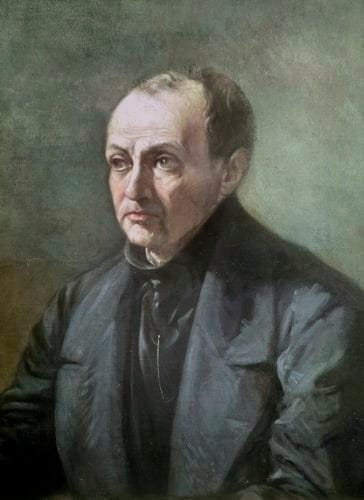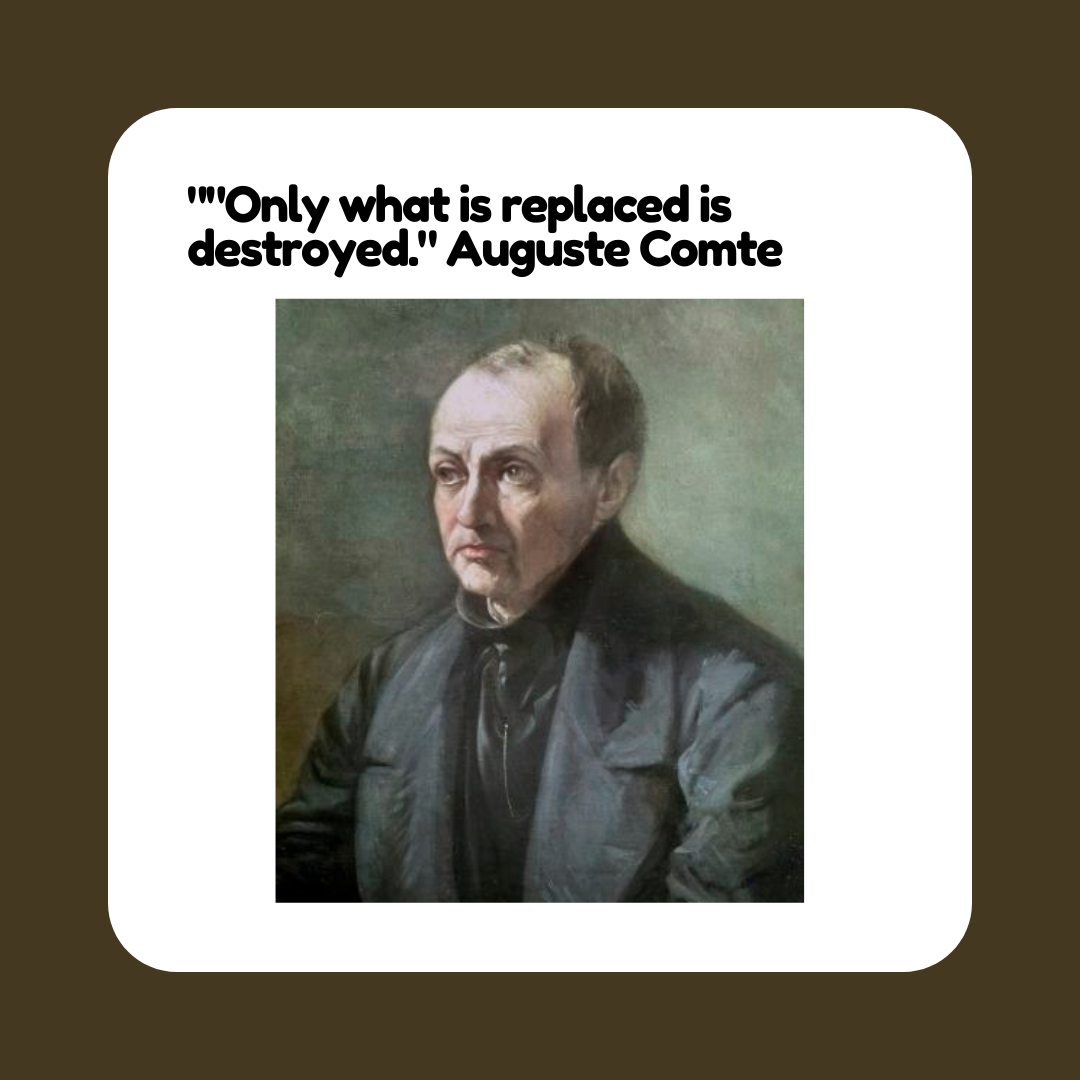The Gnostic is a Believer
Part III of an Analysis of Eric Voegelin's Six Gnostic Traits

Did you take a sociology class in high school or college?
Did you know sociology’s founder, August Comte (1798-1857), was kind of a dick? The Encyclopedia Britannica says he was “ungrateful,” “self-centered,” and “egocentric.” If those aren’t bad enough, other biographers say he was a megalomaniac, cruel, and downright nuts.
Comte, on the other hand, considered himself a relevant man, to put it modestly. He was born at the end of the Enlightenment and fully embraced its ideals,[1]which Isaiah Berlin summarized as:
1. Every genuine question can be answered. If it can’t be answered, it’s not a genuine question.
2. The answers to the questions can be discovered, learned, and taught.
3. All the answers are compatible with one another.
Those ideals are captured perfectly by science. Science is the discipline of power: it answers questions and puts them into neat boxes. Physics is especially good at this.
Comte concluded that the principles of physics could be applied to society: “social physics” is what he initially called it before calling it “sociology.”
By applying scientific findings and mathematical truths to social interactions, the government and its intellectual advisers could greatly improve society.
He was positive it would work. He was so positive, in fact, that he popularized the term “Positivism” to describe his and other contemporary academics’ extremely positive expectations of science
Comte was hailed as an academic hero. The French erected statues and monuments in his honor and named streets after him. He had replaced the hidebound restrictions of tradition, king, and pope with the only thing that could be trusted: science, bolstered by math. No more religion, just facts.
Comte Knew Religion was Necessary, so He Came Up with a New One to Celebrate Science
Or maybe not.
Comte himself didn’t think it was possible to get rid of religion.
Comte believed (he was “positive”) that modern science can reform society, but to do this, Comte taught, God and questions of being must be wholly excluded. He also understood, however, that such things couldn’t just be stomped out. They had to be replaced.

Comte seemed to acknowledge that we exist as a greater whole. He knew mankind needed to worship, that such an urge is at the heart of human nature.
He just wanted mankind to worship Humanity instead of God. Humanity, for Comte, was “the one truly great Being.”[2]
I’m not sure it ever occurred to Comte that questions of existence and being are hard-wired into us because we are metaphysicians . . . creatures who exist in the metaxy. . . whose reality is on the continuum of the Tao-->essence-->existence. Instead, he simply acknowledged that it was a fact, perhaps a vestige of a bygone era, and that the fact must be re-engineered through Positivism to replace “God” with “Humanity.”
Comte took Positivism’s role as a divine substitute seriously. He wanted to build a “Religion of Humanity”:
He taught there must be “the positive priesthood” to administer the “new spiritual power” created by “social physics.”
He was convinced that he would be preaching Positivism by 1860 at the Cathedral of Notre-Dame de Paris as the only real and complete religion.
He envisioned that a great statue would be erected to the deity of Humanity, which would sit on top of the altar at Notre Dame, which would be repurposed for his new religion, complete with newly minted rituals and sacraments.
Toward the end of his life, he thought a “positivist papacy” had become a reality through his work (making him the first positivist pope?) and that it would be carried on in the same manner the Catholic Church is carried on from pope to pope.
He taught that there should be nine “social sacraments” (two better than the Catholic Church’s seven), including one that is received after death and resembles the Church’s process of canonization.
He wanted society to adopt a new calendar, which would replace the Church’s liturgical year and the secular Gregorian calendar, with a calendar consisting of 13 months, each named for a great man in European history, with each day of the year dedicated to other great men, thereby effectively replacing religious holidays and saint feast days with secular equivalents.
Comte is Exhibit A of the Third Gnostic Trait
It’s all a stark illustration of the third (of six) gnostic trait: belief. Eric Voegelin:
The third characteristic is the belief that salvation from the evil of the world is possible.
The gnostic is dissatisfied with her situation (trait one). She believes her unsatisfactory situation is the result of a world that is poorly organized (trait two). But instead of giving up, she embraces the belief that the world can be changed: it can be organized better, with the result that her innate unhappiness and dissatisfaction can be eliminated (belief . . . trait three).
It’s not hard to see how the gnostic belief attains religious fervor, which is a constant theme of James Lindsay’s ongoing critique of Marxist critical theory and postmodernism (more on both subjects later).
Shift back to Comte, who is, incidentally, the first modern gnostic in these essays. Machiavelli, Bacon, Descartes, even Rousseau: they weren’t gnostics (maybe Rousseau . . . he’s just too bizarre to say anything definitive about him).
But Comte was a gnostic.
The first gnostic trait: Discontentment. Comte was intensely unhappy and discontented, which spurred him to be cruel to his wife, a reformed prostitute that he persistently vilified, including in pamphlets that contained explicit details of her former life.
The second gnostic trait: Belief that the discontentment is the world’s fault, not his own. Comte’s personal life seethes with this trait.
The third gnostic trait: Belief that salvation from the world is possible. Enter Comte’s Religion of Humanity. He explicitly--unashamedly, bold-facedly--erected the Baconian ideal of empiricism into an ersatz religion: He took an idea (an epistemological thing) and elevated it to an ontological ideal (a little religion).
The gnostic is a believer, and Comte was a fervent one.
There are, of course, three more traits to be covered. Comte hits them as well, but now I’m getting ahead of myself. Traits four, five, and six will be addressed in future installments.
[1]Denis Diderot is the poster boy of the Enlightenment. Comte referred to him as “the great Diderot,” celebrated his “robust wisdom,” and wanted him to be recognized as a secular saint of sorts.
[2] Henri de Lubac, The Drama of Atheist Humanism (Ignatius Press, 1995), 171.
Related
A chapter called “The Religion of Humanity” introduces readers to the founder of utilitarianism, Jeremy Bentham, and his disciples Mill, James and John Stuart, as well as their French mentor, Auguste Comte, the self-proclaimed founder of the “Religion of Humanity” (who liked, Wilson tells us, to be addressed as “La Fondateur de la réligion universelle, Grand Prêtre de l’Humanité”).


